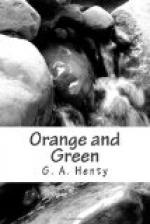“I am truly obliged to you,” Captain Davenant said. “It will make me comfortable to know that, whatsoever may befall me, they will have a friend in these stormy times.”
“Say nought about it,” Jabez replied. “Did not you and your son succour my boy in his extremity? If I do all, and more than all that I can in this matter, I shall not deem that we are quits.”
The Irish army moved forward to the Boyne, which William was approaching from the north. James’s officers endeavoured to dissuade him from setting everything on the hazard of the battle. They represented that his army, though now quite unequal to the contest, was rapidly improving in skill and confidence in itself; that reinforcements were every day expected from France, which would at least make them equal to the enemy in numbers; that they were in want of arms, artillery, and stores, all which might be expected also from France, in a short period; and that their policy was clearly to protract the war, and wear out the enemy by a contest of posts and sieges.
Unskilled as his troops might be in the field, they had proved themselves steady and resolute in the defence of fortified places. They held all the great fortresses of the kingdom, and it would be easy to provide for the defence of these, and to occupy William’s army in small affairs, till the winter, when the climate would do execution upon the invaders, while the Irish would suffer little. Then would be the time to fight.
In the meantime, it was urged, the intrigues the French were actively carrying out in Britain would have produced some effect. The French fleet was, every day, expected on the coast of England, and William would soon be compelled to return to that country, if not to recall the greater part of his army. In Scotland, too, the French were busy; and there were materials in that country for creating a powerful diversion. To fight now would be to forego every advantage, and to meet the views of William, whose obvious interest it was to bring the contest to an immediate decision, now, while every circumstance was in his favour.
But James, who had hitherto shown nothing but timidity and hesitation, was now seized with an impulse of valour. Having acted with unfortunate cowardice before Derry, and Schomberg’s camp at Dundalk, he was, as unfortunately, now seized with ardour to fight, when prudence and discretion would have been his best policy. But while James was determining to fight, in the teeth of the opinion and advice of his bravest officers, his true character was shown in his taking every precaution for his personal safety. He sent off his heavy baggage, and engaged a vessel, at Waterford, to convey him to France.
William, on the other hand, was naturally eager for an early engagement. He was still very insecurely seated upon the English throne. The people were either discontented or indifferent. They looked with impatience and indignation at the crowd of Dutch officers and civilians, whom William had brought over with him; while the cold and ungracious manner of the king contrasted, most unfavourably, with the bearing to which they had been accustomed in English monarchs.




